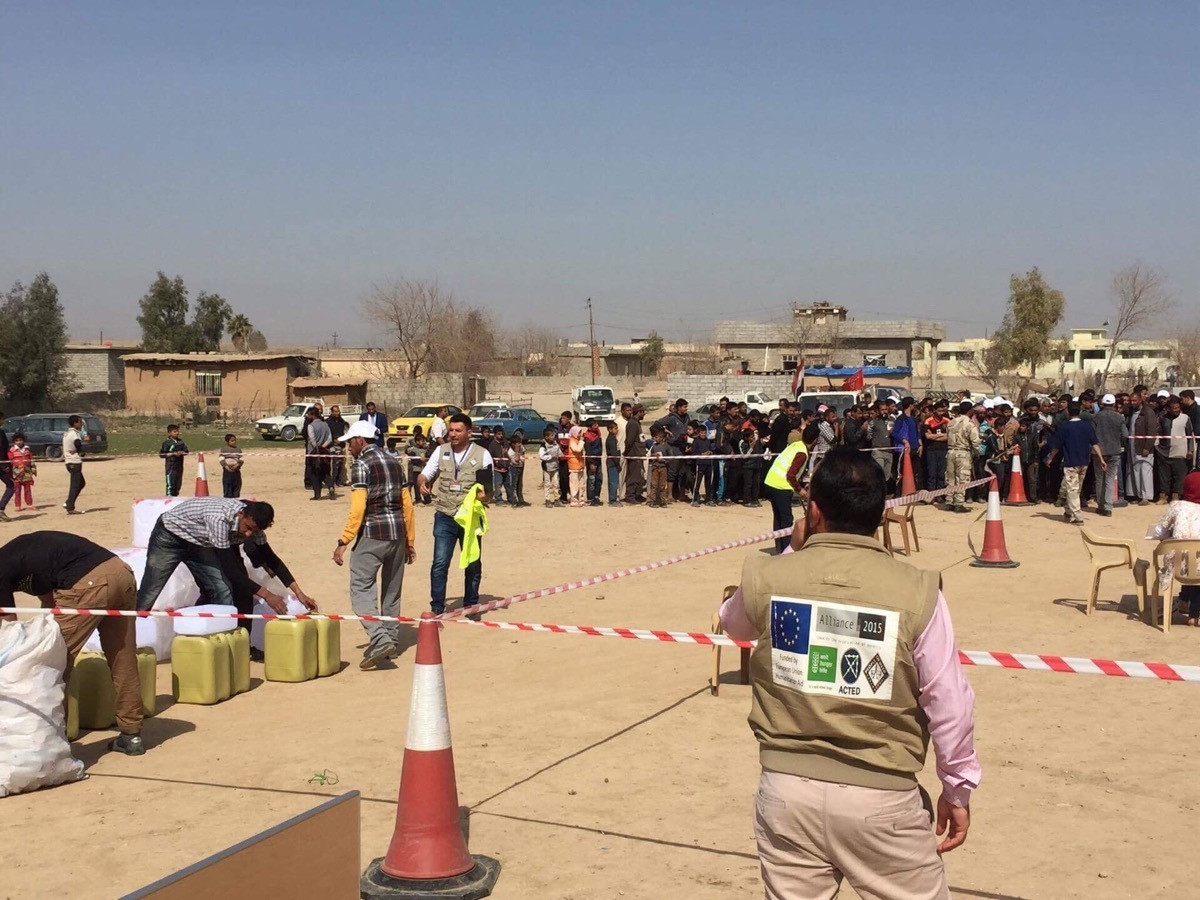‘Everything is Useful’: Alliance2015 and ECHO Provide Emergency Support to Families Fleeing ISIL
Published: May 17, 2017 Reading time: 5 minutes Share: Share an articleLast year, before military operations to retake Mosul city from Islamic State of Iraq and the Levant (ISIL) began, the humanitarian community in Iraq was already preparing for the consequences. NGOs were already building stockpiles of resources, predicating that over one million people could be at risk of displacement and that hundreds of thousands would be forced to rebuild their lives from scratch having lost or abandoned their homes and possessions.

Between October 2016 and January 2017, Iraqi forces, supported by a US-led coalition, were able to reclaim the east of Mosul city and have since started pushing to remove ISIL from the west. Today, 7 months after operations began, over 615,000 people have been displaced and this number continues to grow week on week.
Having prepared a joint response strategy, three Alliance2015 partners in Iraq, People in Need, Welthungerhilfe and ACTED launched a project, funded by EU Humanitarian Aid (ECHO), to provide coordinated, life-saving, humanitarian assistance to those in need. By sharing resources, tools, local expertise and structural support, Alliance2015 partners work together to meet the most pressing, emergency needs with the widest possible reach.
What are Alliance2015 and EU Humanitarian Aid doing for people around Mosul?
Through this ECHO-funded project, the Alliance2015 partners have been supporting crisis-affected populations since October 2016 across a multitude of sectors. Together, we are supporting those who have been displaced from Mosul city and are struggling to cope without basic everyday items, as well as those living in neighbouring communities who are required to share resources and inadequate infrastructure with the thousands of people on the move.

One aspect of our support is providing immediate relief to displaced families by equipping them with some of the items they need to get back on their feet and start to rebuild their lives. To date, Alliance2015 partners have distributed kits full of essential household items such as blankets, heaters, cooking sets, mattresses, water containers and more to over 1450 families. Additionally, we have distributed over 1080 winter kits, comprising household and shelter items designed to help keep families warm as temperatures drop at night and there remains limited access to electricity. In order to compensate for the lack of access to sufficient infrastructure, we have also distributed kerosene and jerry cans to 2577 displaced families for cooking and warmth.
Welthungerhilfe recently spoke with Imran, a father of five from east Mosul, who had been living in Mosul under ISIL since the group took over the city in 2014. Imran describes the impact this has had on his ability to support his family and how all forms of assistance are useful and welcome following such conditions.
“For two years under ISIL I have not once had a ten dollar note or more in my pocket. My children are suffering and require medical assistance. Our community needs work, rehabilitation and resources – I have nothing…Everything is useful,” he explains.
Supporting Access to Water, Sanitation and Hygiene
Families on the move through under resourced and conflict-affected areas are also in great need of immediate water, hygiene and sanitation support. Water infrastructure in the surrounding areas of Mosul where large numbers of people are being displaced is often damaged or insufficient to accommodate such an influx of people. One of the key concerns when dealing with insufficient water and hygiene infrastructure is the potential negative impact this may have on people’s health. To support displaced families and their host communities, Alliance2015 have been ensuring access to clean drinking water through water trucking. To date, ACTED has provided clean water to over 50,000 people. Additionally, Alliance2015 have been responding to other immediate hygiene needs by distributing more than 1530 WASH kits and 490 baby kits. These kits include shampoo, soap, a towel, sanitary pads, toothpaste, toothbrushes and detergent and specific items for babies such as diapers, rash cream and soap. People in Need also established 6 portable toilets on the outskirts of eastern Mosul for people arriving from western Mosul. At the moment, approximately 100-200 families use these toilets every day though this number is anticipated to increase dramatically in the coming days as people are evacuated from western Mosul.
Emergency Education: Finding Normalcy and Playing Catch Up
For children in and around Mosul, the psychological impact of living under ISIL coupled with the disruption of displacement has made accessing suitable and sustained education virtually impossible. As families continue to return to areas retaken from ISIL, education is once again a priority for families who are keen to give their children a sense of normalcy and the opportunity to catch up on months, even years, of schooling missed. As part of this ECHO-funded project, People in Need’s emergency education teams were able to provide over 2,200 conflict-affected children with psychosocial support in order to help them cope with the effects of conflict and displacement. As part of our efforts to encourage children to get back to school, each child was given a backpack full of notebooks and stationery and schools in these host communities were supplied with learning and teaching materials for the coming year.
In the Pipeline
With military operations ongoing, the crisis worsens and more people are displaced and left in need of emergency support. Alliance2015 and EU Humanitarian Aid will continue to assist civilians affected by this crisis. In the coming weeks, we will continue distributing non-food items and kerosene and further increase access to water through water trucking, small-scale rehabilitations of water sources and the construction of a pipeline to Salamyah camp to serve incoming displaced families from west Mosul.

.JPG)



